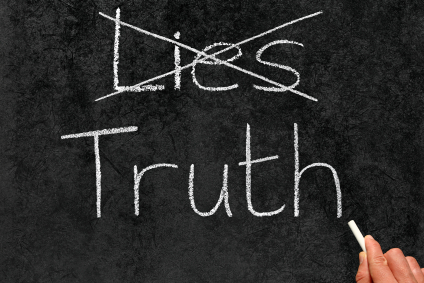When I was in the seminary in New York, we had a problem with one of guys there: he smelled… badly. You could smell him coming; when he left the room, it was like he was still there; when you entered a room where he was last night, you could feel his presence. It was like he was like God: he could be in multiple places at the same time. When you walked by his room, you had to hold your breath. It got so bad that people would avoid him. No one wanted to sit with him during meals in the cafeteria. When I was with him, I’d try to breathe through my mouth. The only problem with that is that I couldn’t do it while eating. At first I’d try to resist the smell, but after a while, I just couldn’t fight it, so I decided just to breathe it in!
I’m joking, but it was actually very bad. What was worse? The way everyone treated him. Many avoided him, complained about him behind his back and no one told him.
Question: what would you do? Seriously, how do you tell him? No one else did. If you were in his shoes, would you want to know? How many would want to be lied to? How many want the truth? You see, when no one told him, the result was everyone avoided him and he was still offending other people. But to tell him might be worse: it would be extremely hurtful and embarrassing to him. But at least he could change.
This situation of not wanting to hurt other people happens in other areas of our life. When we’re dating, things usually start off well and everyone’s happy. Then comes the time when the other person starts acting strangely, we wonder what’s going on, and then it’s time to sit down and talk. We know what’s coming and they tell us that we’ve got to break up, but then they add, “It’s not you, it’s me,” which we all know is another way of saying, “It’s you!”
Personally, I’d rather be told the truth, even if it hurts! I want the truth rather than a lie. This goes for our relationships, with our doctor (who would want a doctor who doesn’t tell the truth?), and at work. If we were passed over for a promotion, wouldn’t we want to know the hard truth?
Bringing this idea closer to home, let me ask you a serious question: here at St. Anthony’s, do you want me to lie to you? Do you want me to hide the truth, or avoid certain topics? Because many parishes do avoid talking about certain things and I know of priests who will not say the whole truth because they don’t want to hurt people.
Today, Jesus commands us: “If your brother or sister sins against you, go and point out the fault” (Mt 18:15). The first reading has the same message but with a consequence, “So you, O son of man, I have made a watchman for the house of Israel; whenever you hear a word from my mouth, you shall give them warning from me. If I say to the wicked, ‘O wicked ones, you shall surely die,’ and you do not speak to warn the wicked to turn from their ways, the wicked shall die in their iniquity, but their blood I will require at your hand” (Ez 33:7-8).
Priests must warn people and speak God’s truth. Parents must do the same with their children. It’s our duty before God. But more importantly, the fundamental nature of our faith is to speak the truth because it’s loving to speak the truth. Correcting people, when done kindly, is always an act of love.
No one wants to be lied to, but are we all ready for the alternative? Do we realize that when we come to Church, when we read the Bible, we’re going to hear things that challenge us, that’ll make us feel uncomfortable, even guilty? Jesus corrected people all the time. And sometimes there’s never a perfect time to tell people things they don’t want to hear.
So, if I preach on a controversial topic, please know that I do it out of love: 1) out of love for God, because I love Him, want to follow Him and be a good disciple; 2) out of love for you, because I don’t want to lie to you; 3) and out of love for the truth, because the truth sets us free. This means that I’ll do it gently and not in a mean way. It also means I’ll always give Church teaching, not my own—that’s key: if we hear something we don’t like or disagree with, we should always ask ourselves, “Is what he saying Church teaching?” We shouldn’t just say, “I don’t like this.” We should be concerned if this is official Church teaching. If you think it isn’t, come tell me; we’ll look it up together.
Speaking the truth means we will talk about difficult topics: sin, hell, homosexuality, abortion, why only men can be priests (which is a fun one!), why priests don’t married, etc.
What will be our response? Will people leave because they don’t like what they hear? It’s one thing to leave because what was said was wrong (which is a legitimate reason), it’s another thing to leave because we disagree with it (which is a bad reason because it’s not based on truth). Will people hate me for it? I’m not worried about being hated. I’m worried that people will be filled with anger. Some people may stop going to Mass or stop practicing faith. But notice that if people do that, it’s not because they figured out something better, but because they didn’t like what they were hearing. Others may go to another church. But are they going because they want to hear the unadulterated truth?
Since we want the truth, let’s be prepared to come to Mass and be challenged.
Back to the story: I was tired that we were hurting this priest, so I prayed about it and built up the courage to talk to him about it. I knocked on his door and said, “Father, can I talk to you about something, please?” After some hesitation and confusion on my part, he realized something was serious and said to me, “Speak plainly, brother.” I told him the hard truth, that people had been avoiding him because he smelled badly. He took it very maturely and we searched around to find out what was causing the smell. We discovered that he had moth balls in his closet and so we got rid of them. Problem solved.
The truth sets us free. After I’ve explained to many people the Church’s teaching on women’s ordination, sexuality, sacrifice, etc., many have said to me “Why didn’t anyone tell me this before?” They said this because it made sense and helped them. The truth is sometimes hard, but it’s better than a lie.
